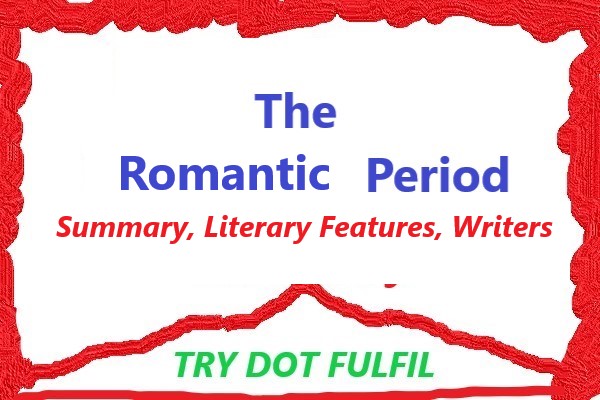Romantic Period Summary, Romantic Period Literary Features, Romantic Period historical events, romantic period writers, Try.Fulfil, Saiful Munna.
- Name: Romantic Period
- Duration: 1798-1832
 |
| Romantic Period Summary, Romantic Period Literary Features, Try.Fulfil |
Romantic period summary:
The Romantic period is one of the
most remarkable period in history of English literature. The duration of this
period is from 1798-1832. The word romantic has been derived from the
word romance which means to have firm attraction towards someone with
emotions and feelings. The Romantic period began in 1798 with the publication
of Wordsworth and S.T Coleridge’s ‘Lyrical Ballads’. Rousseau is the father of
Romanticism. Romantic period is also called the Revival of Romanticism.
Romantic Period is also called The Golden Age of Lyric/Age of Revolution.
Romantic period is opposite to Neo-Classical Period.
Romantic Period: Literary Features:
The important features of Romantic
Period are:
- High Imagination
- Love for beauty
- Love for nature
- Supernaturalism
- Melancholy
- Escapism
- Love for Medievalism
- Optimism
- Pantheism
- Subjectivity
- Mysticism.
Romantic Period: Historical Event:
Some most important historical
events are found in Romantic period. These are: American Revolution, French
Revolution, The Napoleonic War etc.
Romantic Period: Major Writers:
William
Wordsworth (1770-1850): William
Wordsworth is the most prominent poet among the Romantic poets. He was the
pioneer of the Romantic Movement. William Wordsworth is a worshiper of nature
and he was mostly called the Poet of Nature.
Wordsworth believed that the company of nature gives joy to the human heart and
he looked upon nature as a healing force. In his eyes, nature is a teacher
whose wisdom we can learn if we want and without which any human life is vain
and incomplete. William Wordsworth is also known as the Poet of Childhood and Lake Poet. William Wordsworth believed in
Pantheism. Wordsworth along with S.T. Coleridge, launched the Romantic Period
in English Literature with the publication of Lyrical Ballad. Some of William Wordsworth’s notable poems: I
Wandered Lonely as a Cloud, The Tintern Abbey, London 1802, The Prelude etc.
John Keats
(1795-1821): John
Keats is another great poet of Romantic tradition. John Keats is a poet of
beauty. Keats is a death hunted poet. John Keats’ relation to natural sights, sounds
and objects is hearty and deep. Keats’ sensuousness has made him different from
other poets. John Keats’ pictorial quality is like a painter. Nature was also a
source of Keats’ inspiration. Keats’ poetical life was just 5 years. John Keats
used Escapism, Negative capability, Hellenism on his writings. Keats became world famous because of his
noteworthy odes. Some of John Keats’
notable odes: Ode to Nightingale, Ode to Autumn, Ode on a Grecian Urn etc.
Percy
Bysshe Shelley (1792-1822): P.B Shelley was one of the England’s first poets of
the Romantic era. P.B. Shelley is considered as a reformer and revolutionary
poet. Shelley becomes a rebel against all the existing evil of human society.
P.B. Shelley’s humanitarianism, love for liberty and hatred of oppression
turned him into a rebel against all injustice and social follies of the than
society and he desires immediate regeneration. P.B. Shelley doesn’t like
supernaturalism. Shelley is one of the most revolutionary thinkers that claim
poetry can change the shape of the world. Some of his well-known and popular
works are: Ode to West Wind, To a Skylark, Adonais etc.
Samuel
Taylor Coleridge (1772-1834):
Samuel Taylor Coleridge was both
poet and literary critic during the Romantic period in England. Coleridge is
considered as a supernatural poet as well as a true representative of English
romantic poetry. Wordsworth and Coleridge jointly composed ‘Lyrical Ballads’.
Like Wordsworth, Coleridge is also a pantheist. Supernaturalism, strangeness,
remoteness are the main features of S.T. Coleridge’s poetry. Some of Coleridge's popular works are: The Rime
of the Ancient Mariner, Kubla Khan etc.
Lord
Byron: (1788-1824):
Lord Byron is also a famous
Romantic poet but different from other romantics. Lord Byron is a poet of
enthusiasm, mockery, and satire where Wordsworth is of tranquillity, Shelley is
of Love and humanity, Keats is of beauty and melody. Byron is famous for his
descriptive power. Lyrical quality, satirical power, personification, epigrammatic
art is the features of his writings. Byron’s literary epics include “Don Juan”
and “The Minerva”. Byron’s remarkable
poems are: The vision of Judgement, Hours of idleness etc.

















0 Comments